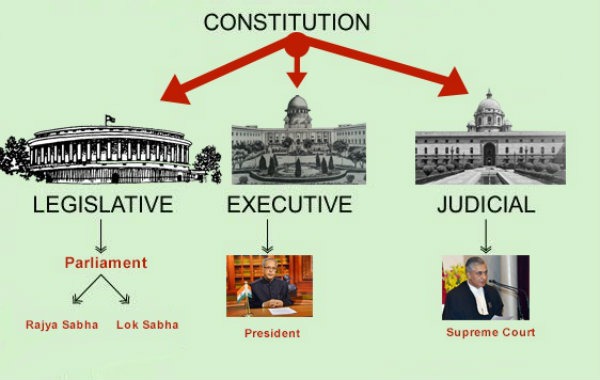Israel’s Controversial Judicial Reform Bill Gets Parliament’s Nod
Context:
Despite months of widespread protests and objections from international partners, Israel’s hard-right government on Monday managed to get a crucial portion of its contentious judicial reform plan through Parliament.
What is the Judicial Reform Bill all about?
- Initiators of the reform: Reform’s proponents include Simcha Rothman, chair of the Knesset’s Constitution, Law and Justice Committee, and Yariv Levin, deputy prime minister and minister of justice.
- Goal of the Reform: The primary objective of the reform was to reduce the judiciary’s influence over legislation and governmental decisions. The government worked to create a more effective division of authority between the democratically elected legislative branch and the judicial branch.
- Limiting Judicial Review: The proposed change aimed to limit the Supreme Court’s ability to conduct judicial review of Knesset-passed legislation. Currently, the Supreme Court has the authority to deem Knesset legislation unlawful; however, the reform would provide Knesset with the ability to overturn this decision. By passing the Supreme Court’s ruling, the Knesset might resubmit the law and pass it with a majority vote.
- Judicial Appointments Changes: The goal of the reform was to alter the composition of the Judicial Selection Committee and increase government influence over the selection of judges. By making this step, the government would effectively assume control over the appointment of judges from the judiciary.
- Control over Legal Advisors: The proposed reform called for alterations to how government departments choose their legal advisors. Instead of using the current procedure with the Justice Ministry’s expert oversight, it proposed to have ministers appoint and remove legal advisors. The reform also sought to directly subordinate these advisors to the ministers and make the legal advice they provide recommendations rather than obligations.
- Additional Planned Steps: According to the coalition government, which is led by Benjamin Netanyahu, the planned amendments are just the first stage in a larger plan for judicial reform. They had other proposals, such as alterations to how legal advisors and other important public servant jobs were appointed.
How did the Public respond to the bill?
- Reaction and Protests: The planned reform prompted major international and domestic reactions and protests. A halt to the reforms was demanded by opposition figures, activists, and even Israeli President Isaac Herzog, who charged that the administration was trying to take total power by destroying checks and balances.
- Temporary Pause and Resumption: Following widespread demonstrations and general strikes, Netanyahu declared a brief halt to the reform process to hold talks with the opposition. The administration eventually continued its plans to pass some of the laws unilaterally after talks to reach a consensus fell apart.
- Legislative Update for July 2023: On July 24, 2023, the Knesset approved a law that eliminated the Supreme Court’s ability to deem executive actions irrational.
What is India’s Doctrine of Separation of Powers?
- Separation of powers doctrine
- To avoid an excessive concentration of power in a single organization, the concept separates governmental authority across three branches.
- A system of checks and balances is ensured by the various roles and responsibilities of each branch.
- Government Control:
- On the judiciary
- Judges who engage in misconduct or show a lack of competence may be subject to impeachment proceedings by the legislature, which could result in their removal from office.
- Laws may be amended by the legislature to address the court’s concerns and revalidate them if the judiciary rules that a law is unconstitutional (ultra vires).
- On the executive
- Vote of No Confidence: The legislature has the power to enact a motion of no confidence in the government, which would dissolve the executive branch and possibly call for fresh elections.
- Examining administration acts: The legislative can hold the administration responsible for its decisions and acts through procedures like the question hour and zero hours.
- The legislature has the authority to remove the President from office in the event of serious misconduct or a violation of the Constitution.
- On the judiciary
- Executive Control:
- Regarding the judiciary: The president has the power to nominate judges, including the Chief Justice, changing how the judiciary is made up.
- Regarding the legislature: Delegated legislation: The legislature has given the executive some authority to make the rules and regulations required for putting laws into effect. The legislative process is now subject to some executive control.
- Subject to the limitations of the constitution, the executive has the authority to establish policies and guidelines that will guide both its behaviour and that of the various arms of government.
- Judicial oversight
- On the executive
- Judicial Review: The judiciary has the authority to conduct judicial reviews to assess the constitutionality of executive actions. An action may be ruled invalid and null if it is determined to be unlawful.
- On The legislature
- Unamendability of the Constitution: In the 1973 Kesavananda Bharati case, the judiciary established the notion that the fundamental provisions of the Constitution cannot be changed. This protects the essential integrity of the Constitution by prohibiting the legislature from changing some fundamental concepts and values.
- On the executive
What are the disadvantages of implementing the bill?
- Erosion of Checks and Balances: Opponents of the reforms contend that they compromise the democracy’s long-standing system of checks and balances. There are worries that by giving the government more control over judicial appointments and legal advisors and restricting the judiciary’s ability to exercise judicial review, the executive branch could amass too much power, possibly leading to misuse or corruption.
- Weakening Judicial Independence: Giving the government more authority over judicial selections may weaken the independence of the judiciary because judges may feel under pressure to make decisions that favour the government rather than impartially upholding the law.
- Potential for Political Interference: There are fears that legal advice may become politically driven rather than based on objective legal considerations, impacting the decision-making process, as the government exerts more control over legal consultants to government departments.
- Concentration of Power: There is a chance that the executive and legislative branches will hold a greater amount of power as a result of restricting the court’s ability to review Basic Laws and allowing the government to override Supreme Court decisions on legislation. This could weaken democratic institutions.
- Breach of Public Confidence: The reform proposals have resulted in strong opposition and demonstrations in Israel, highlighting a gap in the public’s opinion. Political unrest and social unrest may result from a decline in public faith in the government’s dedication to sustaining democratic norms.
- International Concerns: According to the international world, the revisions could harm Israel’s standing as a democratic country that upholds the rule of law. Foreign relations, trade, and diplomatic ties may be impacted by this.





